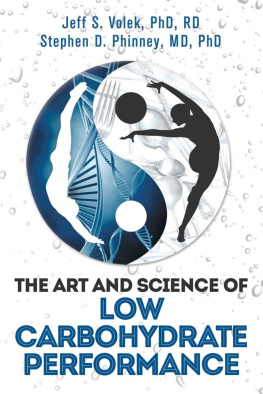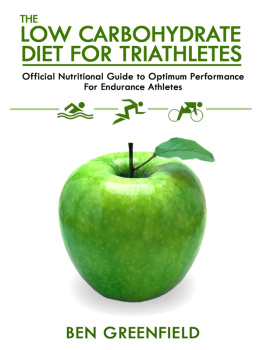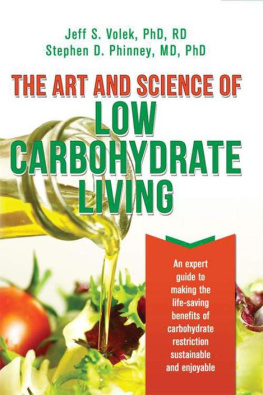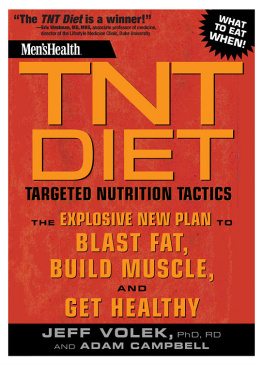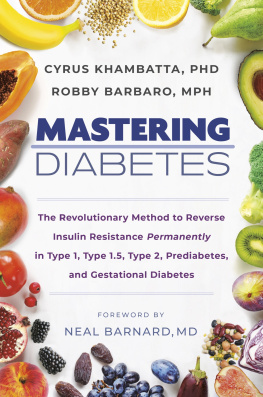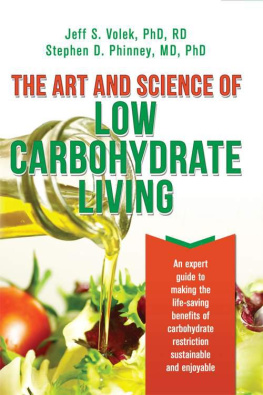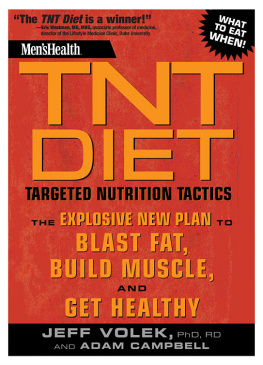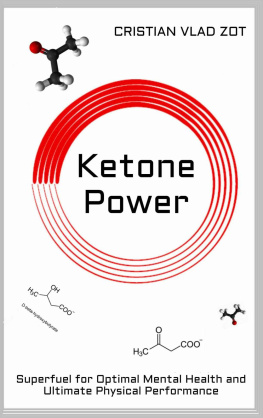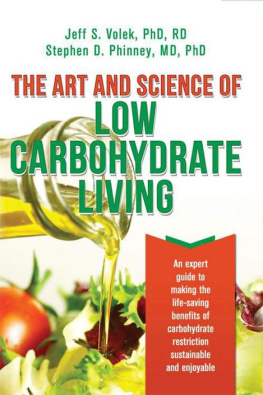THE ART AND SCIENCE OF
LOW CARBOHYDRATE
PERFORMANCE

A Revolutionary Program to Extend Your Physical and Mental Performance Envelope
Jeff S. Volek, PhD, RD
Stephen D. Phinney, MD, PhD
Other Books by Jeff Volek and Steve Phinney
Mens Health TNT Diet
Jeff Volek and Adam Campbell
Rodale Books 2008
The New Atkins for a New You
Eric Westman, Jeff Volek, and Stephen Phinney
Fireside/Simon & Schuster 2010
The Art and Science of Low Carbohydrate Living
Jeff Volek and Stephen Phinney
Beyond Obesity LLC 2011
(available at www.createspace.com/3608659)
Above Evil A Science Prediction Novel
Stephen Phinney
Beyond Obesity LLC 2012
(available at www.createspace.com/3779119)
The information in this book is provided to assist the reader in making informed choices about diet and exercise. This book is neither intended as a substitute for medical advice nor to replace professional athletic coaching. Before starting any diet, you should consult your personal physician.
Copyright 2012 Beyond Obesity LLC
All rights reserved.
Cover design by Brian Zimmerman
ISBN: 978-0-9834907-5-3 (ePub)
ISBN: 978-0-9834907-1-5 (Print)
Visit us at www.artandscienceoflowcarb.com
Additional paperback copies available at www.createspace.com/3827132

QED stands for Quality, Excellence and Design. The QED seal of approval shown here verifies that this eBook has passed a rigorous quality assurance process and will render well in most eBook reading platforms.
All eBook files created by eBook Architects are independently tested and certified with the QED seal. For more information please see:
ebookarchitects.com/QED.php
Contents
Acknowledgements
The opening paragraph of our recent book The Art and Science of Low Carbohydrate Living discussed the ancient Chinese curse: may you live in interesting times. In the intervening year, we sense even more movement towards a consensus change; whereby the clinical use of low carbohydrate diets in the management of insulin resistance may soon become mainstream. We are genuinely appreciative of the positive and constructive feedback from people who have taken the time to write us. Many of you asked specifically about exercising during a low carbohydrate diet, and several shared your personal experience with us. Your feedback inspired us to write this book. Now we say to each other we live in really interesting times because its looking like a consensus change on the use of low carbohydrate diets for athletes may come sooner than their general use in medical care.
We are thankful for the support of the many people who encouraged us to address the role of low carbohydrate diets in sports and exercise. We appreciate the thoughtful comments on early drafts from Peter Defty, Peter Davis, Brian Kupchak, Brittanie Volk, and Cynthia Moore. A special thanks to those low carbohydrate pioneer athletes who were willing to share their personal experience for this book Tony Ricci, Andrea Hudy, John Rutherford, Bettie Smith, Doug Berlin, David Dreyfuss, and Jay Wortman.
I (Steve Phinney) wish to thank Dr. Richard Handler who introduced me to cycling, Dr. Edward Horton who got me started in performance research, and Dr. Bruce Bistrian who taught me to regard nutrition as a science. A special thanks to my co-author and friend Jeff, with whom writing is a joy; and to Doug Bibus for his unwavering friendship and collaboration. Infinite appreciation goes to my family to Lauren and Eric who put up with my abstruse verbal meanderings during road trips up and down Interstate 5; and to my remarkable wife Huong, without whose intellectual GPS I would be forever lost on the backroads of detail.
I (Jeff Volek) wish to thank my supportive parents who provided me many opportunities to play and compete in sports from a young age, Dr. Linc Gotchalk who coached me in the sport of powerlifting, and Dr. William Kraemer who taught me a deep appreciation for the complexity of exercise science. A special thanks to my co-author Steve, who has inspired and enriched my life beyond what I can express in words. Above all I want to thank my loving and patient wife, Ana and my two boys, who supported me in spite of the significant time this book project took away from them.
Section 1
THINKING DIFFERENT
Chapter 1
INTRODUCTION
Humans Can Fly
Perfection is not attainable. But if we chase perfection, we can catch excellence. -Vince Lombardi
If you are completely content with your body, health, and performance on a high carbohydrate diet there is probably no reason to consider a low carbohydrate diet. If it isnt broke, dont fix it. But if you have hit a plateau, are in a rut, suffer from overtraining, have trouble recovering from your workouts, want to change your body composition, or simply want to experiment with how your body adapts to restricting carbohydrate, then this book is for You .
You might be an elite athlete, coach, trainer, dietitian, physician or scientist. You might be a casual fitness enthusiast or wanna-be athlete. You might be new to exercise, a weekend warrior, or a veteran of the gym but arent satisfied with your progress or feel drained. If any of these people are You then this book may have something valuable to offer.

In our recent book, The Art and Science of Low Carbohydrate Living[], we made a strong case for low carbohydrate diets as the preferred approach to managing insulin resistance (aka carbohydrate intolerance). However, on the continuum of insulin resistance, athletes as a group cluster on the side of insulin sensitivity. Thus most athletes do not have anywhere near the same level of carbohydrate intolerance as someone who is overweight with metabolic syndrome or diabetes.
Why then would we recommend a low carbohydrate diet for athletes? After all, the current majority group-think in sports nutrition holds that all athletes have an obligate need for carbohydrate. But despite having the best intentions, the majority view does not always represent the truth. Besides exacerbating insulin resistance, a high carbohydrate diet also locks a person into a dependence on carbohydrate as the dominant fuel for exercise . And every endurance athlete knows what happens to performance when their carbohydrate tank (at best holding 2000 Calories) runs dry performance goes down in flames. Its an unfortunate reality that the human body is unable to promptly switch from carbs to fat as its predominant exercise fuel, so once the former is gone, you cant power your performance with fat (even though a carbohydrate-depleted body still has tens of thousands of fat Calories on hand).
The key fact underlying this book is that you can train your body to burn fat by simply changing your diet over a period of a few weeks, thereby turning blood sugar and glycogen into secondary fuels. Once you make this transition, you can then train harder, perform longer, and recover faster. So the simple answer to why we endorse a low carbohydrate lifestyle for athletes is that this strategy has worked for us and many people we know. More importantly, we have both conducted and published human research that supports this approach, adding to a growing body of literature that now points to the merits of reducing dietary carbohydrates to optimize fat metabolism. We have thus accumulated a unique knowledge base that we want to share so you too may experience it for yourself.

